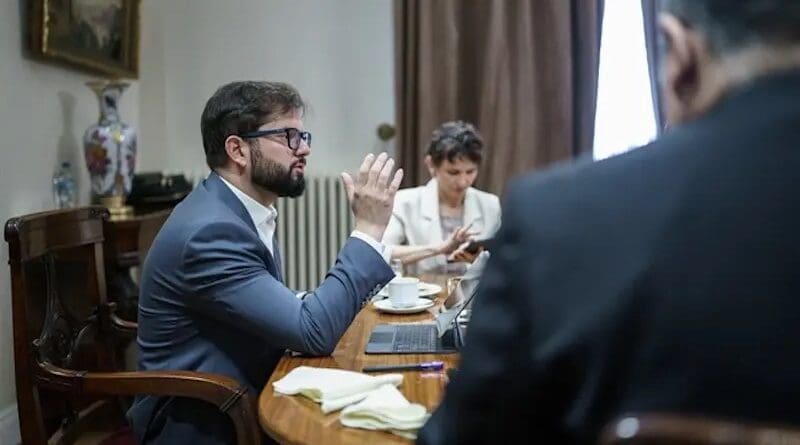Chile: President Boric’s Constitutional Labyrinth – OpEd
One week before Christmas Eve, Chilean voters once again rejected the Constitutional draft with 55.76%. Since his inauguration on March 11, 2022, Chilean President Gabriel Boric has been trapped in constitutional labyrinth for three reasons.
First, political polarization leads to institutional malfunction. In May 2021, Chileans elected a Constitutional Convention where the far left dominated and the right had almost no power to block controversial provisions. The Convention produced a text so radical that nearly two-thirds of voters rejected it in a referendum held on September 4, 2022. Turnout was high, at 86%, but not one of Chile’s 16 regions approved it. Most strikingly, rejection was highest in the poorest areas, with the country’s 10 poorest districts voting 77 percent against the draft.
Then, in 2023, Chileans elected a new Constitutional Council, this time putting a far-right party in charge, with the left controlling fewer than one-third of the votes. The new process underrepresents the left and includes figures with deep ties to the dictatorship, while lacking a mechanism to include the voices of the Chilean people in the process. Consequently, both constitutional processes have lacked mechanisms for connecting local communities to political leadership. The first championed the grassroots in opposition to political leaders, while the second reified current political leaders and their “experts” to enforce order on the grassroots. Neither neoliberalism nor populist revolts have provided guidelines for democratic rule.
Second, Boric doesn’t act like a constitution practitioner. Even as president, he continues to show characteristics of a student leader, i.e. authority-questioning and rabble-rousing. In his lecture at UC Berkeley on February 10, 2020, then Congressional Deputy Boric said, “I am part of the problem…In Chile, since the return of democracy, professional politicians have been progressively moving away from citizens, building an abyss…When you are in the institutions, you start to move away from common citizens.” This was a stunning statement from a high-profile political figure with presidential aspirations and former student movement leader.
On Dec. 30, 2022, Boric decided to pardon 13 convicted by the justice system-12 for crimes during the social outbreak of 2019 and one who belonged to the armed organization Manuel Rodriguez Patriotic Front (FPMR) for an assault on a Santander bank in 2013. It is little wonder that the Minister of Justice Marcela Ríos resigned one week later. Polls showed that 72% of Chileans reject the pardon of the 12 people convicted of various crimes concerning the violent protests of 2019. In the case of Jorge Mateluna, the former guerrilla sentenced to 16 years in prison for a bank robbery, the percentage of people disapproving was even higher at 81%. Consequently, crime far outranks health, pensions, and education—the very issues behind the 2019 protests.
Third, Boric misunderstands the true reasons for his electoral victory. He won the presidency because voters wanted to punish the incumbent administration. Instead, Boric seems to think that the electorate has fully accepted his agenda for radical transformation of Chile. Even the former President Ricardo Lagos urged voters to vote “no” on the new draft. Lagos encouraged moderation from the left for the first draft and then criticized the right-wing radicalism of the authors of the second draft. He insisted that “democracy needs political parties, but the parties must learn to understand and listen to the people.”
Worse still, Boric didn’t show he is responsible national leader. When asked “Have you asked for or do you want an apology from the U.S. government for its involvement during the military coup in 1973?” Boric’s answer only addressed minor points, saying, “I think that the U.S. should reflect on its behavior since it intervened in Guatemala in 1954, overthrowing President Jacobo Árbenz and destabilizing democracy in Latin America. We had bad luck that Nixon was in office when the United States government tried to destabilize the Chilean government. It’s not my place to say if they should apologize.” He was passing the buck.
When Boric was chosen as one of The 100 most influential people in 2022 by Time Magazine, the Nobel laureate Joseph Stiglitz wrote: “With a divided polity and the hard work under way of creating a new constitution, Boric will need all the skills he has already demonstrated—listening and communicating, empathy, and a deep understanding of Chilean history and culture. He is making Chile the social, economic, and political laboratory of the world once again.” This was a warning rather than a recommendation. Tomás Mosciatti, commentator of Chile’s RadioBíoBío, accurately described Boric ambiguity, indecision, and lack of power. For his second half of presidential term, Boric can only continue to kick the can deeper into his constitutional labyrinth.
The good news is that Boric’s coalition of parties has announced that if this draft is rejected, it will not push for a third drafting process.

